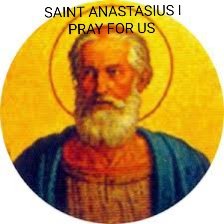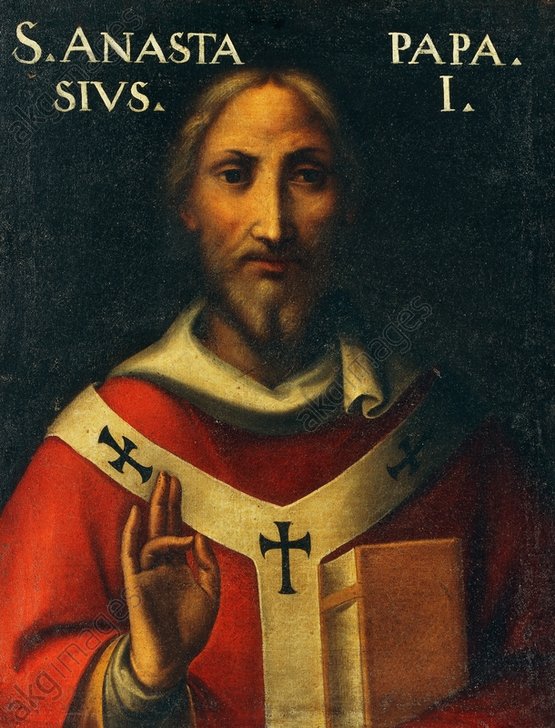FEAST OF SAINT ANASTASIUS I – POPE
FEAST DAY – 19th DECEMBER
St. Anastasius I was born in Rome. He was the son of Maximus, and was Pope from November 27, 399 to December 19, 401. He condemned the writings of the Alexandrian Theologian Origen, shortly after their translation into Latin, earning the praise of St. Jerome for censuring (c. 400) the works of Origen, one of the most influential theologians of the early Greek church.
In papal letters he condemned several Origenist writings, which he probably did not understand, and disapproved the spreading of Origen’s teaching. Anastasius’ virtues were praised by his admirers, Saint Augustine of Hippo, Saint Jerome, and Saint Paulinus of Nola. Pope Anastasius’ papacy was marked by controversy, as he supported Saint Jerome in his work of translating the Scriptures into Latin, taking a stand against Rufinus of Aquilea’s more allegorical interpretations and translations of the Bible.
In 400, Anastasius arranged a council to consider the writings of Origen, after receiving a letter from Patriarch Theophilus of Alexandria expressing strong doubt about Origen’s fidelity to Christian teaching. The council condemned Origen’s work as heterodox, and Rufinus of Aquiliea wrote to the pope to defend his translation of Origen’s First Principles, which St. Jerome had attacked. Anastasius upheld the council’s decision.
He fought against these writings throughout his papacy, and in 400 he called a council to discuss them. The council he assembled agreed that Origen was not faithful to the Catholic Church. During his reign we also know he encouraged Catholics in North Africa to fight Donatism. It was Pope Anastasius who instructed Priests to stand and bow their head as they read from the Gospels.
Among his many friends were Saints Augustine, Jerome and Paulinus. St. Jerome speaks of him as a man of great holiness who was rich in his poverty. Anastasius is buried in the Catacomb of Pontian. He was an early saint of the Church. His papacy was only 25 months long, and he passed in 401. We also know he spent his time in the papacy defending the Catholic Faith. His son followed him as Pope Innocent I, a child of his prior to his entering the Clergy. His feast day is 19 December.
PRAYER
O God, in Your goodness and wisdom You raise up leaders for Your Church who are rooted in Your Word and Your Will. Through the intercession of Your servant, St. Anastasius I, may we be loyal to our Faith in following their directions. This we ask through Christ our Lord. Amen

Your life, St. Anastasius I, reminds us that in our efforts to preserve God’s Word we must be willing to undergo the work of prayer, study, vigilance, and humility, to get rid of opposition.
Help us always venerate and uphold God’s Holy Word. Saint Anastasius, pray for us.
******************************************************************************
ALSO CELEBRATED
BLESSED URBAN V (POPE)
In 1362, the man elected pope declined the office. When the cardinals could not find another person among them for that important office, they turned to a relative stranger: the holy person we honor today.
The new Pope Urban V proved a wise choice. A Benedictine monk and canon lawyer, he was deeply spiritual and brilliant. He lived simply and modestly, which did not always earn him friends among clergymen who had become used to comfort and privilege.
Still, he pressed for reform, and saw to the restoration of churches and monasteries. Except for a brief period he spent most of his eight years as pope living away from Rome at Avignon, seat of the papacy from 1309, until shortly after his death.
Urban came close, but was not able to achieve one of his biggest goals—reuniting the Eastern and Western churches.
As pope, Urban continued to follow the Benedictine Rule. Shortly before his death in 1370, he asked to be moved from the papal palace to the nearby home of his brother, so he could say goodbye to the ordinary people he had so often helped.
PRAYER
Heavenly Father, simplicity in the midst of power and grandeur defined the saint venerated today, Blessed Urban V, as he reluctantly accepted the papacy, but remained at heart a Benedictine monk. He proved that surroundings need not negatively influence a person.
We are blessed to have the exemplary life of Blessed Urban V before us, to know how your grace is sufficient for the least of our brothers, who work and conduct their lives for the welfare of others, in Jesus’ Name. Amen
